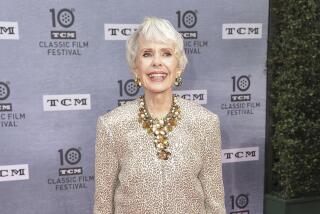Irwin Rosten dies at 85; documentary filmmaker
Irwin Rosten, an award-winning documentary filmmaker perhaps best known for “The Incredible Machine,” which took PBS viewers on a revolutionary voyage inside the human body in 1975, has died. He was 85.
Rosten died May 23 at his Hollywood home after a brief illness, his family said.
He was the writer, director and producer of “The Incredible Machine,” an early National Geographic special that had “extraordinary impact,” said Nicolas Noxon, a documentarian who was Rosten’s longtime business partner.
“It was very, very popular and sort of opened people’s eyes to what could be done with a documentary,” Noxon said. “It was groundbreaking for its time.”
Medical researchers had been making inroads in taking pictures inside the human body — such as sending cameras into the digestive system or taking microphotographs of blood — but Rosten was perhaps the first “to collect all that data and put it together” for public viewing, Noxon said.
“The Incredible Machine” remained the highest-rated show in the Public Broadcasting Service’s history until 1982.
It was nominated for an Academy Award, the second of two nominations that Rosten received. “The Wolf Men,” a 1969 documentary that he produced about the hunting of timber wolves in North America, also had been nominated.
Rosten would go on to create such programming as “Mysteries of the Mind,” an Emmy-winning documentary for PBS about the human brain, and “Elephant,” one of many projects that featured animals.
The rising popularity of documentaries in the early 1960s “was simply a question of television catching up with the public,” Rosten told The Times in 1963 as he cited the popularity of nonfiction books and magazines.
In the 1960s, Rosten worked for David L. Wolper, a major independent producer of documentaries, and made a number of National Geographic specials. They included an early Jacques Cousteau documentary and another about the grizzly bear.
When “Grizzly” was nominated for an Emmy, Rosten’s friends and colleagues placed an ad in Variety that his family said included this disclaimer: “This space paid for by the admirers of Irwin Rosten, a modest man who cannot be trusted to blow his own horn.”
He was born in 1924 in Brooklyn to immigrants from Russia and Poland who owned a drugstore.
After working for the DuMont Network in New York, Rosten moved to Los Angeles in 1954 and joined CBS affiliate KNXT. One of his highly regarded projects was “Thou Shalt Not Kill,” a 1958 documentary that examined capital punishment.
Writing in 1959, The Times’ Cecil Smith described Rosten as a “young man with magic in his pen.”
Two years later, he moved to KTLA-TV Channel 5 to become a writer-producer of documentaries and special programs. One of his final documentaries for the station was 1963’s “Split Image,” which was about Camarillo State Hospital’s patient-operated closed-circuit TV.
While working for Wolper, Rosten met Noxon, and the pair eventually jumped to MGM and set up the studio’s documentary unit. Their first venture was a 1968 documentary on Clark Gable.
As early as 1963, The Times referred to Rosten and Noxon as “one of the finest young teams of documentary makers.”
Rosten was known for mentoring others and was a terrific cook — Chinese food was a specialty, said his son, Peter, a former movie and TV producer.
The elder Rosten traveled the world in pursuit of his subjects, going to Japan to film parts of the 1970s National Geographic specials “Gold” or to Russia to record “The Volga” about the major European river.
As was often the case, Rosten returned with a story that amused him. A Soviet news agency official had proposed arm-wrestling to decide whether a Soviet or American film crew would be used on “The Volga.” Rosten’s heftier National Geographic colleague took the challenge, but the match ended in a draw. Crews from each country were used.
In addition to his son, Peter, of Darby, Mont., Rosten is survived by his wife of 23 years, Marilyn Ryan.
Services were private.
More to Read
Start your day right
Sign up for Essential California for the L.A. Times biggest news, features and recommendations in your inbox six days a week.
You may occasionally receive promotional content from the Los Angeles Times.







